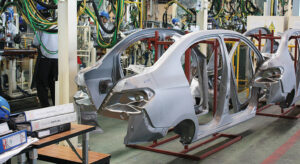Legislator backs CARS-like incentives for more automakers
MORE INCENTIVES are needed to support other carmakers not currently enrolled in the Comprehensive Automotive Resurgence Strategy (CARS) program, a legislator said.

By Justine Irish D. Tabile, Reporter
MORE INCENTIVES are needed to support other carmakers not currently enrolled in the Comprehensive Automotive Resurgence Strategy (CARS) program, a legislator said.
Representative Rufus B. Rodriguez said that the expansion to other manufacturers of CARS, which rewards automakers that hit certain volume production quotas, will help the auto industry develop.
“We believe that even if the government spends by giving subsidies per unit to the members of the CARS program, what we give to subsidize production costs will be recovered by employment and taxes,” Mr. Rodriguez told reporters on the sidelines of the Auto Reverse Trade Fair.
Mr. Rodriguez’s House Bill No. 4206, also known as An act to strengthen the competitiveness of the Philippine motor vehicle manufacturing industry, has been with the House Committee on Trade and Industry since September 2022. As yet no counterpart bill has been filed in the Senate.
He said the economic contributions of automotive manufacturing remain significant, with motor vehicle and parts manufacturing output valued at P689 billion, or 10% of manufacturing output overall.
He added that the sector is among the most productive, generating that level of output with 109,808 workers.
“Imagine how much more the industry can contribute if we have a larger production base. My vision for the automotive industry is to truly become an engine of growth by increasing its value output, employment, and labor productivity,” he said.
He said that although the Board of Investments (BoI) included automotive manufacturing in the Strategic Investments Priorities Plan, the newly signed Corporate Recovery and Tax Incentives for Enterprises to Maximize Opportunities for Reinvigorating the Economy (CREATE MORE) Act is not sufficient to address the industry’s needs.
“CREATE MORE is a ‘one size fits all’ measure that may not address concerns that are peculiar to the automotive industry,” he said.
He said HB No. 4206 offers an inclusive and technology-neutral framework for fiscal and non-fiscal support covering all segments of the automotive industry.
“This is not only for car manufacturers but also for parts manufacturers. The people involved in parts manufacturing are all Filipino, benefiting 400,000 families,” he said.
He added that the bill will allow for more participants to join CARS-type incentive programs as long as the government can afford the subsidy.
BoI Industry Development Services Executive Director Ma. Corazon Halili-Dichosa said that the BoI is also waiting on the passage of the law to support local manufacturing.
“We support that. In fact, when the congressman calls for a committee hearing, we are in attendance. We hope it will be passed soon,” Ms. Halili-Dichosa said.
She said that manufacturers believe that “CREATE is not really enough, so that is why they want the CARS Program.”
She added that the machinery involved in the manufacture of cars is capital-intensive, making subsidies such as those given under CARS significant.
“Our automotive industry is beset with a lot of challenges that constrain its growth to full potential,” she said.
“The supply chain remains limited for various reasons, and there are also persistent regulatory challenges that make it easier to sell imported completely built units than locally assembled vehicles,” she added.
Between 2015 and 2023, she said imports accounted for 71% of auto sales.
According to CARS participants Toyota Motor Philippines Corp. and Mitsubishi Motors Philippines Corp., the local-content ratio of their Vios and Mirage compact car model exceeds 60% and 40%, respectively.












